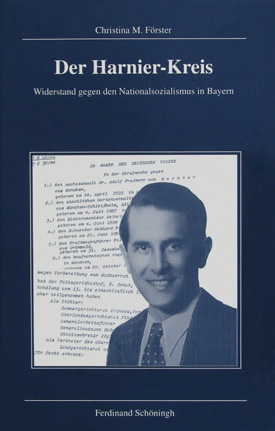Förster, Christina M.: Der Harnier-Kreis. Widerstand gegen den Nationalsozialismus in Bayern, Paderborn [u. a.] 1996

In August 1939, the Gestapo arrested over 150 people in Munich and Upper Bavaria, thereby smashing a resistance circle of peculiarly Bavarian character. Criminal procedure on charges of preparation for treason, initiated that same year, was delayed not least because of Adolf Hitler’s personal intervention and finally concluded in 1944, when the Volksgerichtshof (»People’s Court«) delivered its verdict. The circle's two leading men, Baron Adolf von Harnier and Josef Zott, paid with their lives. Zott was executed in January 1945 at Brandenburg Prison, Harnier died of hunger-induced typhus in Straubing Prison, after a nearly six-year incarceration.
By being the first to mine these extensive source materials, the author casts light onto an important but previously little-known resistance circle. At the same time, her utilization of personnel files, interrogation records, and the Munich Gestapo's surveillance reports enables a revealing look into the viewpoints and operational methods of the Nazi terror apparatus.
The study is linked to the impressive biography of the circle's central leader, the Munich lawyer Adolf von Harnier. Harnier’s personal papers, letters, and files convey the picture of a courageous Christian, who since 1933 risked conflict with prominent Nazi representatives and after 1938 took on the defense of hard-pressed Jewish clients.
Förster’s account of the proceedings in the People’s Court »criminal case against Harnier and others«, which is closely oriented on the source material, constitutes an important case study of the terror apparatus and judicial history of the Third Reich. Through her attention to the personal histories of the protagonists, the author injects an understanding of the psychological and physical effects caused by years of imprisonment into her study of legal proceedings.
A pathbreaking work in more than one respect, this book makes important specific contributions to the field of research on resistance to National Socialism.
To order our publications, please, contact your local bookshop or the publishing house Schöningh in Paderborn.
